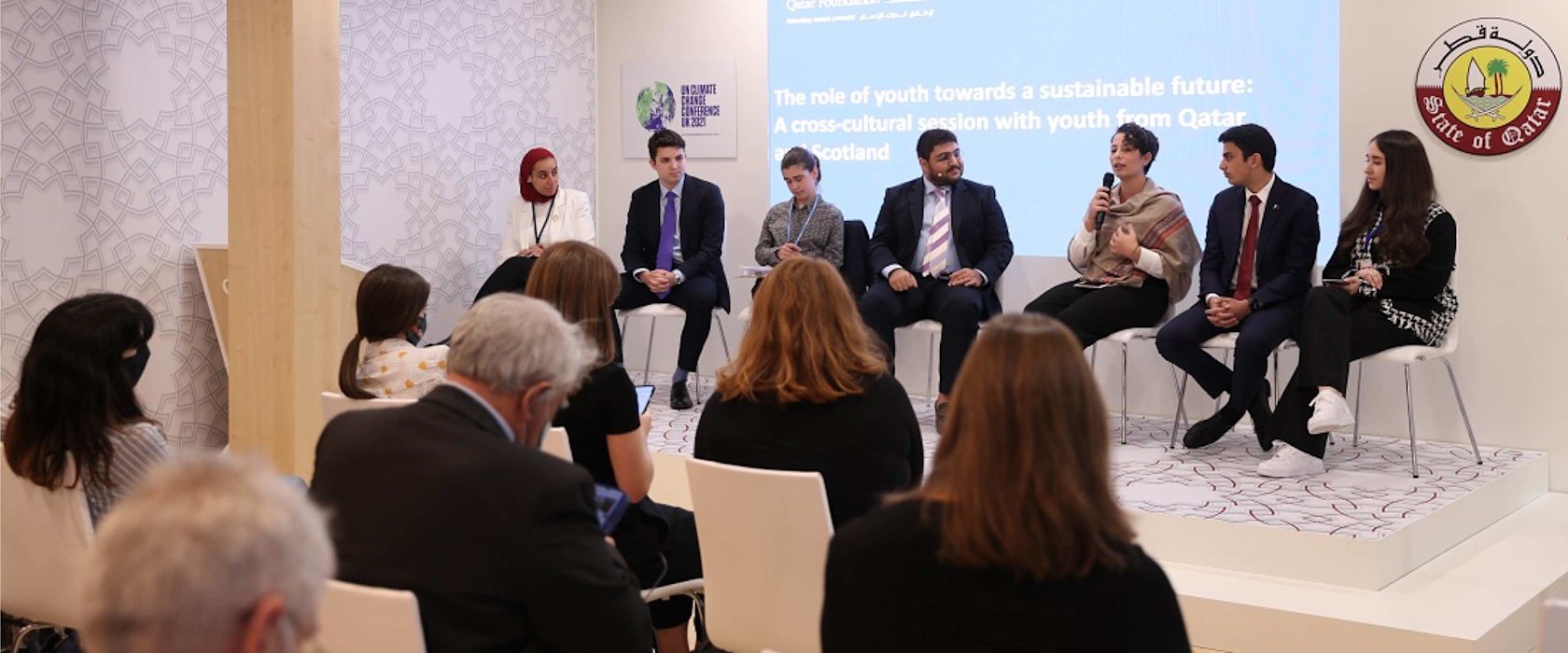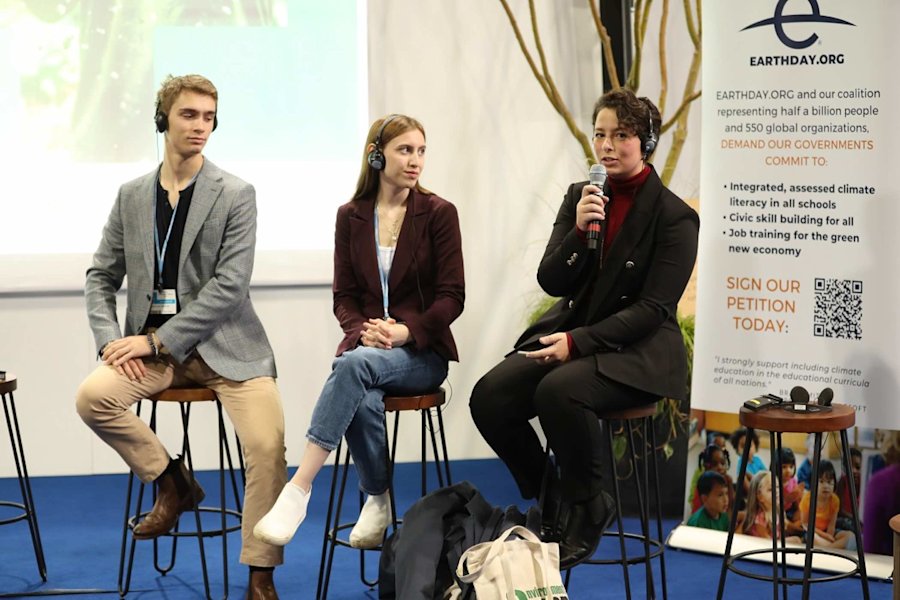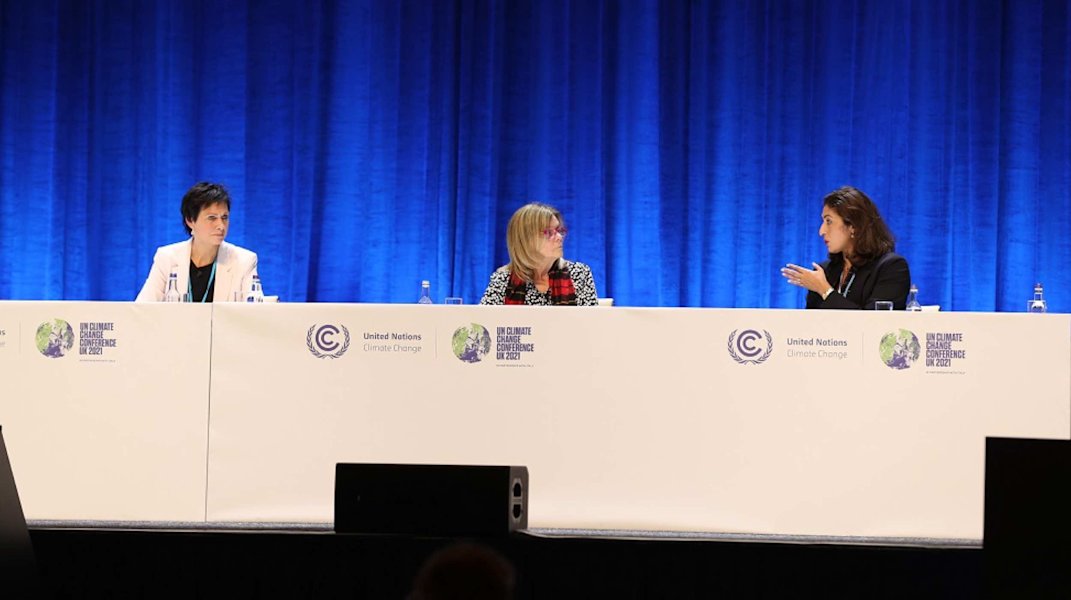Coronavirus (COVID-19) Updates
For the latest COVID-19 information and updates from Qatar Foundation, please visit our Statements page

Young activists from QF’s THIMUN Qatar say youth must be listened to and involved in protecting the future during crucial global climate conference
Young activists from Qatar have lent their voice to a global youth-led call for climate education to be part of academic curricula, at the COP26 global climate change conference in the UK.
Members of THIMUN Qatar – a Model United Nations initiative under Qatar Foundation’s (QF) Pre-University Education – also spoke of their fears that youth are being “acknowledged but not listened to” on climate change during a series of sessions in front of international delegates during the crucial Glasgow summit.
Three students from Qatar joined young activists from Scotland in two cross-cultural discussions focusing on why the world’s youth need to be at the forefront of climate action efforts, and how more of them can be empowered to do so. THIMUN Qatar representatives were among the young people who developed a pre-COP26 manifesto for tackling climate change at the Youth4Climate summit in Milan, Italy, last month.
Among the THIMUN Qatar speakers was the initiative’s Secretary General, Giulia Pinna, who told the COP26 audience: “We – the youth – have contributed so much to climate action, so it’s a question of why we aren’t being taught about the climate crisis in formal education.
By embedding climate education in formal curricula, young people will be empowered to act and start change; it’s a great way of motivating them to take action
“By embedding climate education in formal curricula, young people will be empowered to act and start change; it’s a great way of motivating them to take action. They need to be shown the specific impact of this global issue on their local communities, its relevance to their homes, the urgency of it, and why it’s important for them to actively contribute to finding solutions.
“While we stress how involved the youth are in climate action, it’s still only a percentage of the youth. The challenge is to involve as many as possible and capture their attention – whether it’s through music and drama, history, politics, or in another way.
“We are the global citizens. We are the ones taking action. But our climate curriculum doesn’t yet exist. And the way to include what we are saying in curricula is to include us – because global citizens should have a voice.”
According to Sama Ayoub, Deputy President of the THIMUN Qatar General Assembly and a student at QF partner university Weill Cornell Medicine-Qatar, youth need to be “taken seriously” on climate change and “the world needs to believe in us as we believe in ourselves”.
This is an issue that is directly impacting our futures, so listen to us and acknowledge us
“If anyone is going to be in charge of our future, it should be us,” she said. “And what we learn about climate change in school should also be down to us. This is an issue that is directly impacting our futures, so listen to us and acknowledge us – don’t just say you’ve heard us, or take into consideration what we say without acting on it.
“Whatever we decide to study, we should be educated about climate change at school without having to go out of our way to find out more. Around the world, we are not getting the right education on something that is going to affect us not in decades, but in years. By embedding climate change education within schools, young people – whether they decide to be a doctor, engineer, teacher, or something else – will be educated about this issue, and consequently educate others around them.”
And THIMUN Qatar student officer Abdallah Al Darwish told the cross-cultural session: “One of the biggest challenges young people will face is finding the right resources, education, and support to take the action they want to take.
Across the world, we need more QFs, more resources, and more educators to go into the community and help young people take their climate action projects forward.
“At THIMUN Qatar, we have these resources because of QF. But across the world, we need more QFs, more resources, and more educators to go into the community and help young people take their climate action projects forward, to the point where they become reality and their goals are accomplished.”
During COP26, Pinna also participated in a session with youth activists from Asia, Africa, and Europe on the need for climate literacy, saying: “If you speak to just a couple of young climate activists, they will come up with things nobody has ever come up with before and that world leaders will open their mouths in surprise at.
“Across the world, the ideas of so many youth are not shared because they don’t have the platform to share them. By ensuring all our youth are educated about this issue and understand it, we can take their ideas further and provide solutions that the world needs.”
Empowering young people comes from education, but also by providing them with the skills they need to create their own startups; to create something that is their passion
In a COP26 side event on climate education and youth empowerment, Aysha Al-Mudahka, Director of Strategic Initiatives and Partnership Development, QF, said: “It’s very important to give students the right platforms and engage them from an early age, by providing the right ecosystem.
“Empowering young people comes from education, but also by providing them with the skills they need to create their own startups; to create something that is their passion, whether it may be a social enterprise or a clean tech business. Providing youth with the right platforms empowers them to speak their mind and share what they feel is right for our environment.”
And Houriya Ahmed, Director of QF’s Policy Hub, told delegates at a COP26 session on the role of education and research in supporting climate action in Qatar: “Our schools at QF are focused on developing the knowledge, skills, attitudes, and behaviors for our students to think critically and develop solutions toward more sustainable patterns of living, and ensuring there is an interface with nature.

Giulia Pinna of THIMUN Qatar participated in a multinational COP26 discussion about the need for climate literacy.

Aysha Al-Mudahka, QF’s Director of Strategic Initiatives and Partnership Development, spoke about the importance of empowering young people to take climate action.
“Providing such learning experiences to our students through areas such as activism around climate change ensures they are able to share their ideas with government, industry, and the wider community.
“We have built an ecosystem at QF that has a research cluster and has students engaged in community programming, but ideally our greatest impact is the impact we make on people. We want to build sustainable practices over the long term, so that we are able to create societal and behavioral change.”



